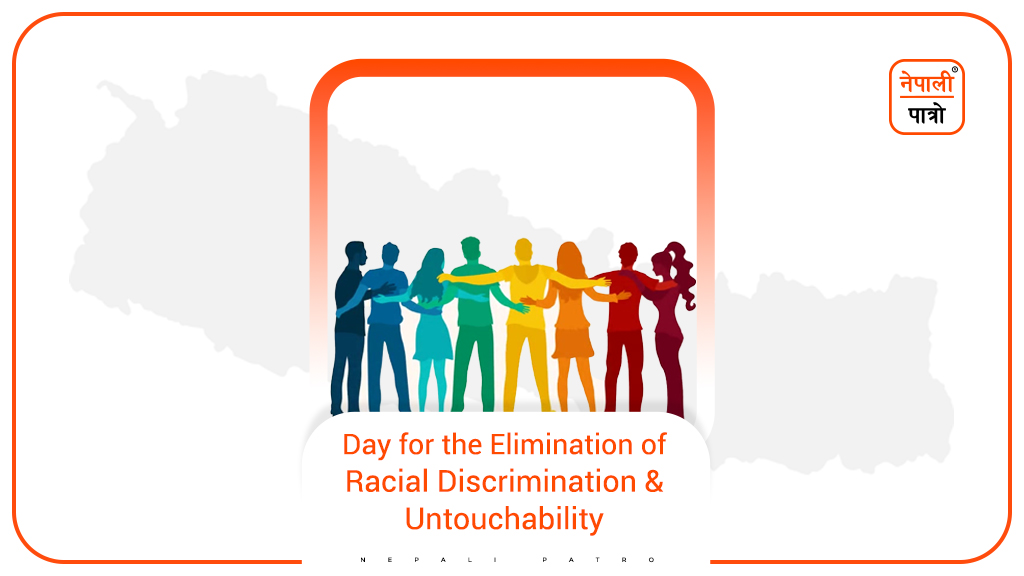
Day for the Elimination of Racial Discrimination and Untouchability
In Nepal, “Day for the Elimination of Racial Discrimination and Untouchability” is celebrated every year on Jestha 21 with various public awareness programs. Even though the then King Mahendra prohibited untouchability in the Civil Act in the year 2020 BS, the practice of untouchability remained the same for many years due to the fact that the law of that time was weak and the law was in the hands of those with access. Since the government declared Nepal as an ethnic untouchability-free nation on B.S 21 Jestha, 2063, in its remembrance the Day for the Elimination of Racial Discrimination and Untouchability is observed every year on Jestha 21 all over the country. Since then, on Jestha 21, Nepal has been celebrating the National Day for the Elimination of Racial Discrimination and Untouchability every year.
Even after 13 years of declaring Nepal as an untouchability-free nation, it is still known that untouchability and discrimination have not been eradicated in various parts of the country due to social behaviors existing in Nepalese society. Although there exists an Offenses and Punishment Act against Caste Discrimination and Untouchability, there are ample factors that can be said to have prevented the elimination of discrimination in practice due to its ineffective implementation. It cannot be denied that the lack of effective implementation of the Basic Misdemeanor and Punishment Acts, the creation of social awareness for its end, and the inability to raise public awareness programs by presenting public awareness programs to the people.
Although the government every year issues a message of good wishes to every Nepali on the occasion of the National Day for the Elimination of Untouchability, and to stand united against caste untouchability and discrimination. As long as every Nepali is united to end the practice of untouchability, like the practice of widowed slavery, the practice of sati, and the practice of kamaiya in the past, the constitution should guarantee special arrangements for the empowerment, representation, and participation of the Dalit community in the interest of the Dalit community. In this context, the current constitution of Nepal has reached 22 percent representation of the Dalit community through local elections which is an important step toward its elimination.
What does the Constitution of Nepal 2072 say?
Article 24 of the Constitution of Nepal 2072 BS includes the right against untouchability and discrimination as a fundamental right. It states that no person shall be subjected to any form of untouchability or discrimination in any private or public place on the basis of his or her origin, caste, community, occupation, or physical condition.
If any such discriminatory behavior, boycott, or prohibition, is imposed or done there is a provision of imprisonment of three months to three years or a fine of Rs 1,000 to Rs 25,000 or both is mentioned. Ethnic untouchability is a serious challenge for state law, humanity, civilized society, and modern nations. The preamble to Nepal’s constitution seeks to end all forms of ethnic untouchability and build an egalitarian society to ensure economic equality, prosperity, and social justice. The constitution also guarantees special arrangements for the empowerment, representation, and participation of the Dalit community under the rights of Dalits.
This day is celebrated in all 75 districts along with the center of Nepal and in all the provinces under the coordination of the Chief District Officer. The government has been forming various committees to implement the elimination of caste discrimination and untouchability plus has included a special budget amount for each fiscal year for its implementation and for its eradication. Funds for the elimination of caste discrimination and untouchability are also included to eliminate the existing problem. It is believed that this “Day for the Elimination of Racial Discrimination and Untouchability” will inspire the creation of social awareness for the perpetual end of serious problems such as caste discrimination and untouchability and inspire a sense of equality among all Nepalis.
The National Dalit Commission has also been recognized as a constitutional body to end ethnic untouchability, and by remembering the important issue of the rights of the Dalits addressed as a fundamental right in the constitution, it has laid the groundwork for the gradual end of the oppression of the Dalit community.
The government by just by forming a committee to implement the elimination of caste discrimination and untouchability, or by sending good wishes, by including money in the budget of each fiscal year for the program of elimination of caste discrimination and untouchability, would not eradicate caste discrimination and untouchability, because just celebrating with various programs for eradication of caste discrimination and untouchability is not enough. For this, we have to resolve to build an egalitarian society to ensure economic equality, prosperity, and social justice by ending all forms of ethnic untouchability in every region of the country.
The achievement of celebrating this Day for the Elimination of Racial Discrimination and Untouchability will soon be seen and felt only if public awareness is raised by addressing this issue among the entire Nepali people all over the country regardless of different zones, districts or social distance from the central government.
Thus, With the celebration of the Elimination of Racial Discrimination and Untouchability this year let us hope soon Nepal will be free from this kind of problem and it would be eliminated as soon as possible through different awareness programs. To Read this article in the Nepali Language please click here.